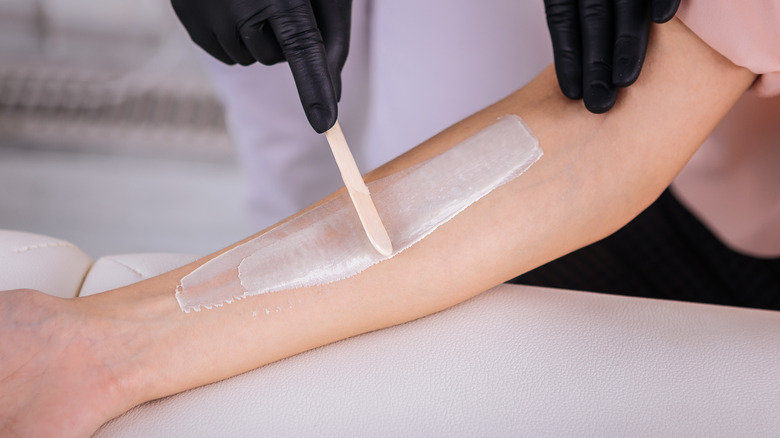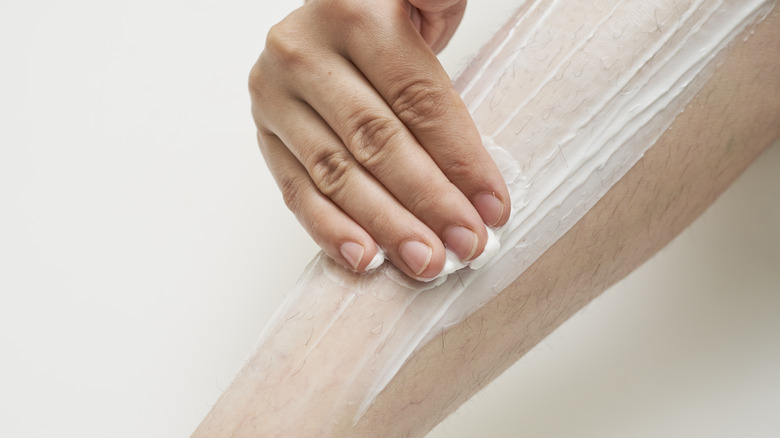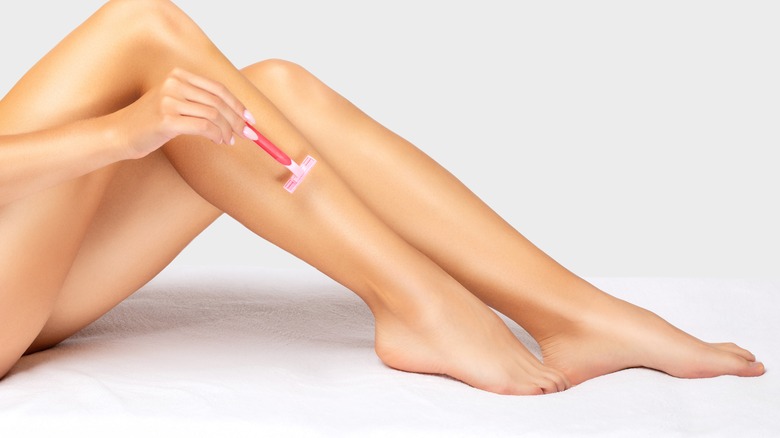Are Hair Removal Creams Better Than Shaving? Here's What We Know
There's no shame in having body hair, but it's understandable why people would want body parts like their legs and underarms to be hair-free. According to Nina Jablonski, an anthropology professor at Pennsylvania State University, hair removal in humans is a fairly new practice, tracing back to only five centuries ago. And apparently, it's primarily due to aesthetic purposes. "We have, through communication with one another, established a globalized practice of removing hair to make women especially look very smooth and have baby-like skin; and for men to retain their body hair," she told Allure.
If you want to zap most of the hair from your body, there are a number of ways to do it. You can try laser hair removal to go hair-free completely, but you can also opt for short-term options like shaving and depilatory creams. Both of these methods allow you to eliminate hair in one fell swoop, making the process fast, easy, and relatively painless.
Then again, both shaving and hair removal creams only remove hair from or just a bit below the skin's surface, so you can expect hair regrowth within two to three days. If you're choosing between the two, it all boils down to what works best for your skin.
Hair removal creams are formulated to protect the skin
There's no concrete evidence that proves that hair removal creams are better than shaving, but Dr. Diane Madfes, dermatologist and assistant professor of dermatology at Mount Sinai School of Medicine, shared with Shape that this specific method targets the hair follicle directly as opposed to shaving that technically only "cuts" the hair. "This chemical reaction causes the hairs to swell and breaks the keratin proteins and disulfide bonds, which leaves the hair weak or dissolved in the hair follicle," she explained.
What's more, Lucy Anderson, the founder of hair removal cream brand WooWoo, told Refinery29 that these days, depilatory creams are specially concocted to be kinder on the skin with the inclusion of ingredients like shea butter. "It's necessary to get the balance right of creating an effective product that's strong enough to dissolve and remove the hair but contains lots of nice, natural oils that protect the skin," she explained. "Nowadays, formulations are much kinder to the skin with oils and actives that leave your skin super smooth."
Hair removal creams are also your best bet if you have sensitive skin or want to avoid incurring those pesky razor burns or bumps. Once applied to the skin, all you have to do is wait a moment for the cream to do its work and then wipe all the hair off.
The advantage shaving has over hair removal creams
The main drawback people complain about when it comes to using hair removal creams is the stench. Since depilatory creams are made up of all sorts of chemicals, they tend to give off an unpleasant smell. Some formulas may also irritate the skin, so you have to pick your preferred cream wisely. "Be careful if using it on areas where the skin is thinner, such as the face, underarms, or groin, as the skin may be more sensitive and more susceptible to a reaction," dermatologist Dr. Marisa Garshick advised PopSugar. "It may be worthwhile to apply a small amount to a certain area to first see if the skin reacts and then after waiting a day or two, proceed with treating the whole area."
On the flip side, you don't have to worry much about any funky odors when shaving, since most shaving creams aren't potent. Just be extra careful about how you align your razor to your skin to prevent hurting yourself and causing ingrown hair. Dr. Annie Chiu told Allure that the optimal way is to shave in the direction of your hair growth. "Shaving against the grain will give you a closer shave, so it's worth it on the legs because the hair is thinner. Getting that close on skin that's more delicate, however, is not totally safe," she noted. "It's gentler on the skin because there's less tension."


